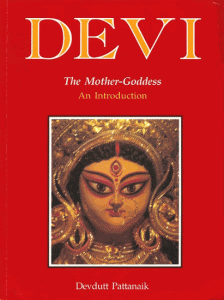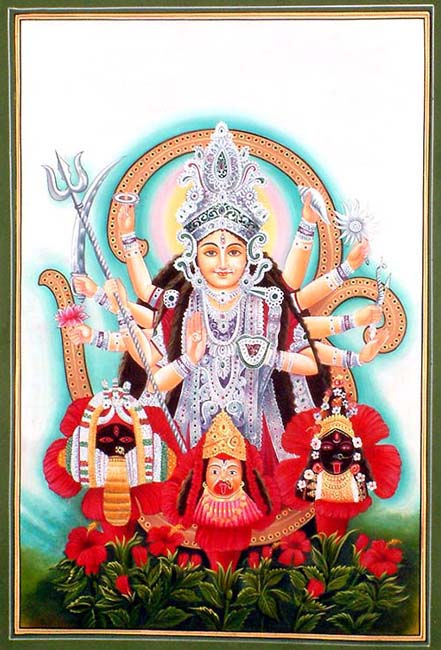Book Review of Devi the Mother Goddess by Devdutt Pattanaik
An engaging, readable introduction to the Hindu goddess concept Book Review of Devi the Mother Goddess by Devdutt Pattanaik
By Kent Davis Buy this book on Amazon
Duvdutt Pattana has created a truly enjoyable overview of this topic, an “introduction” as the cover states, made especially valuable by the breadth of his inquiry. I have studied Asian history, particularly Indian philosophy, for more than 30 years. My focus is understanding the portrayal of feminine forces in the Khmer Hindu universe. This accessible primer has given me new perspectives that “more scholarly” volumes have not.

Dr. Pattanaik writes in a simple style. There are no footnotes and few true photo credits. This is not a formal treatise built upon a foundation of multiple documented sources; indeed that is its appeal.
The author gives a comprehensive view of the diversity of Hindu beliefs relating to the Mother Goddess and her myriad daughters. Note that the author’s worldly view includes goddesses from Japan, Mesopotamia, Egypt, Greece, Oceania, Scandinavia, Gnosticism and Christianity.
His love and respect for the subject of his investigation is clear. This book inspired me to seek knowledge in many new places, as well as recognize things that I already knew but was unsure of.
Students of feminist philosophy will be both shocked and enlightened. The evidence presented suggests a time in the distant past of our planet when female domination, not male, was the rule in society and religion. The implication is that aspects of that world are superior to the one we now inhabit.
If you are a visual person (as I am) you will enjoy the large 8 ¼ X 11 format, filled with large pictures printed on coated stock in color and black and white. Indeed, being printed in India, this book is a bargain for what it delivers.
To summarize, the real benefit here is having all of these feminine myths simplified and placed in a single small volume with well chosen visual evidence.
I discovered Devdutt Pattanaik through his website, which contains a wealth of information and free articles on the topic of “understanding sacred stories, symbols, rituals, and their relevance in modern times.”
There, he describes himself as “medical doctor by education, a marketing manager by profession and a mythologist by passion.” I admit that I found this description irresistible and had no choice but to seek out his books. This was his first that I have read and I was not at all disappointed.
In closing I note that a reviewer of “The Goddess in India: The Five Faces of the Eternal Feminine” critiques that as a watered down version of this book. I have ordered that edition to do a side-by-side comparison but if you consider his comments and mine relevant it seems you will be well served to read “Devi, the Mother Goddess” first.
- Paperback: 126 pages
- Publisher: Vakils Feffer & Simons Ltd; 1 edition (April 2000)
- Language: English
- ISBN-10: 8187111453
- ISBN-13: 978-8187111450
- Product Dimensions: 10.8 x 8.2 x 0.4 inches
- Shipping Weight: 1.2 pounds

Mother Durga, the Goddess Beyond Reach, is shown above, in her 10 armed form.
Below her, from Left to Right, are Three Local forms of the Goddess:
First is Kali Maa from the Kalighat Temple, in Kolkata. This is one of the Shakti Peethas, where part of Sati’s body fell to Earth. This Kali Temple is several hundred years old, and lends it name to the city of Kolkata.
Central is Tara Maa, from Tarapeeth Temple in West Bengal. Also one of the Shakti Peethas, it is said that Sati’s Mouth fell the ground in this blessed spot.
And finally, Bhavatarini Maa, from the Dakhineswar Temple in Kolkata. This temple gained fame as the home to Sri Ramakrishna Paramahamsa (1836-1886), a Saint and Mystic who revolutionized worship of the Mother throughout all of India.
The 3 Goddesses appear in midst of Red Hibiscus flowers, favored by the Goddess Kali.
by Santo Sengupta for www.ExoticIndiaArt.com
